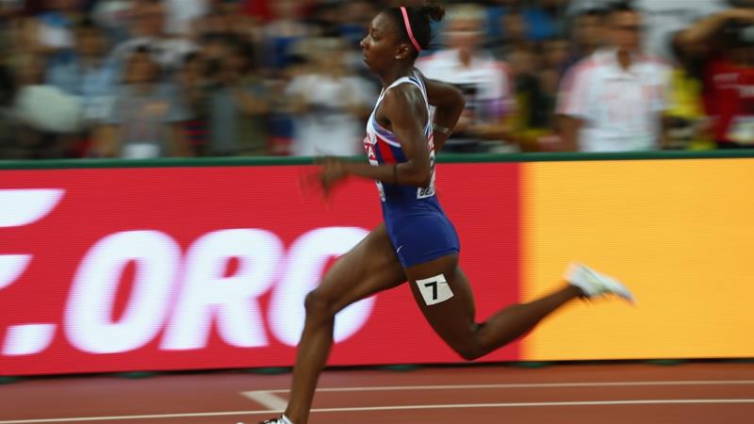British sprinter Bianca Williams and her husband, Portuguese 400m runner Ricardo Dos Santos, were driving back to their home in West London with their three-month-old son when they were stopped by police, pulled out of their car and handcuffed in July.
The police explained at the time they had been stopped because the car was being driven "suspiciously". Nothing suspicious, however, was found during a search of the vehicle and the family were allowed on their way.
Police in the United Kingdom can stop and search a vehicle if they have "reasonable grounds" to think it contains something stolen or prohibited. But this has led to concerns about racial profiling.
The Metropolitan Police referred themselves to the Independent Office for Police Conduct (IOPC), a police watchdog, but their actions had already received scrutiny including from the athletes' coach, Olympic champion Linford Christie, who accused the police of "institutional racism".
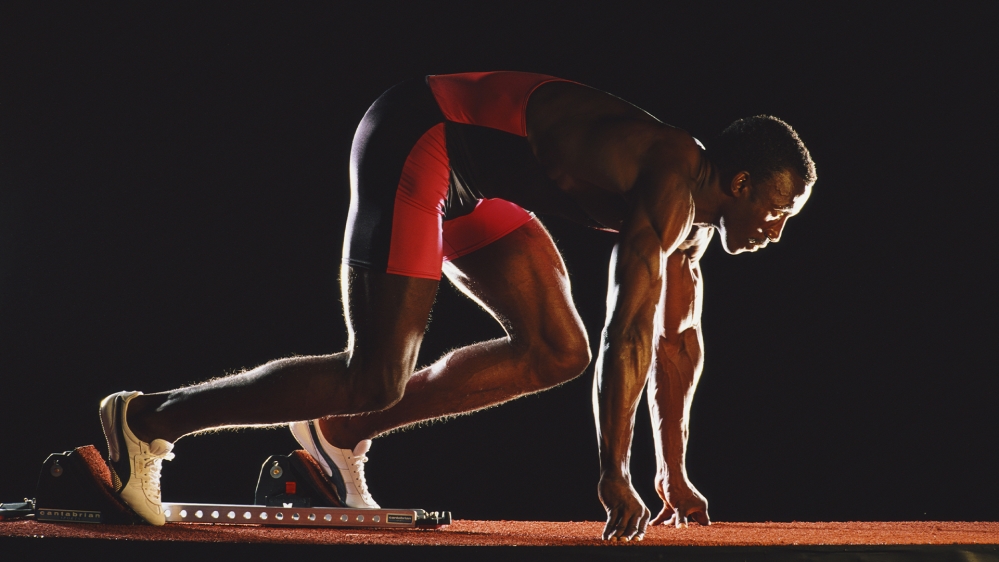
For many, the incident exposed how, regardless of their profession, Black people are treated with suspicion. Williams, who is a Commonwealth Games gold medallist, said it left her feeling like "the scum of their shoe".
Rising racism
Racism is on the rise in the UK. In 2018-2019, there were 103,379 hate crimes recorded by police in England and Wales, an increase of 10 percent on 2017-2018.
The number has more than doubled since 2012-2013. Of the 103,379 cases, three-quarters (78,991) were race hate offences, an increase of 11 percent on the previous year.
In the world of sport, racism has also risen dramatically.
Football's racism watchdog, Kick It Out, reported a 53 percent increase in reported incidents of racial abuse in the professional game between the 2018-2019 season and the 2019-2020 season (up from 184 to 282) - and this despite games being held behind closed doors during the latter stages of the season.
Crystal Palace and Ivory Coast footballer Wilfried Zaha said he faces racist abuse almost every time he steps on a football pitch.
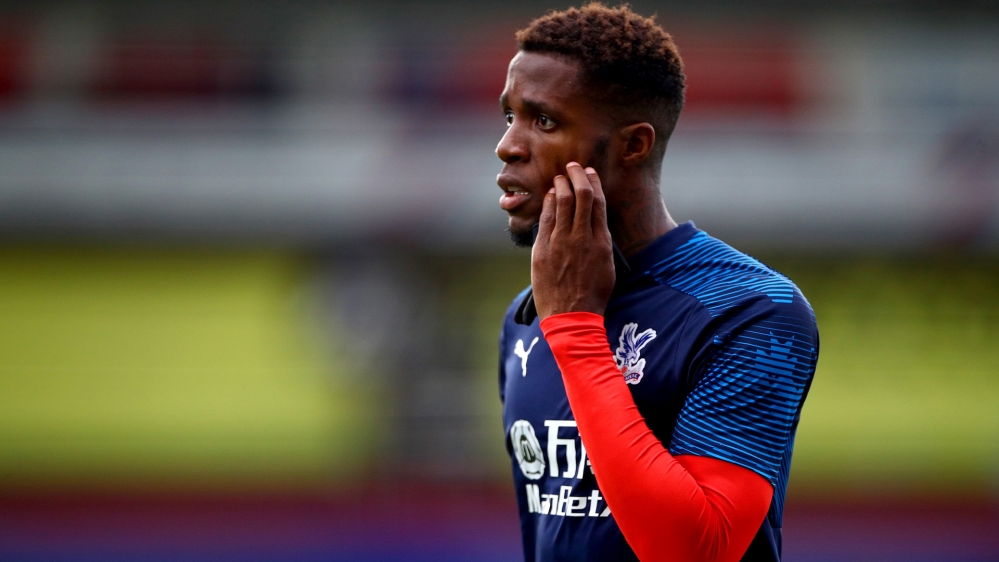
"Nearly every game, I'm called a monkey or a n***** or a whatever," Zaha told The Jackal magazine. "Imagine if I really got down about that?"
The midfielder added: "I don't know if we're animals to them or whatever. Why are you saying these things right next to your five-year-old kid? And then, when you leave, what, you're back to being a normal dad, working a normal job? People mask this stuff."
When matches started to be played behind closed doors due to the coronavirus, racist abuse continued to haunt footballers - via social media.
Zaha and Sheffield United striker David McGoldrick both shared racist abuse they received on social media shortly after the Premier League returned after lockdown in June.
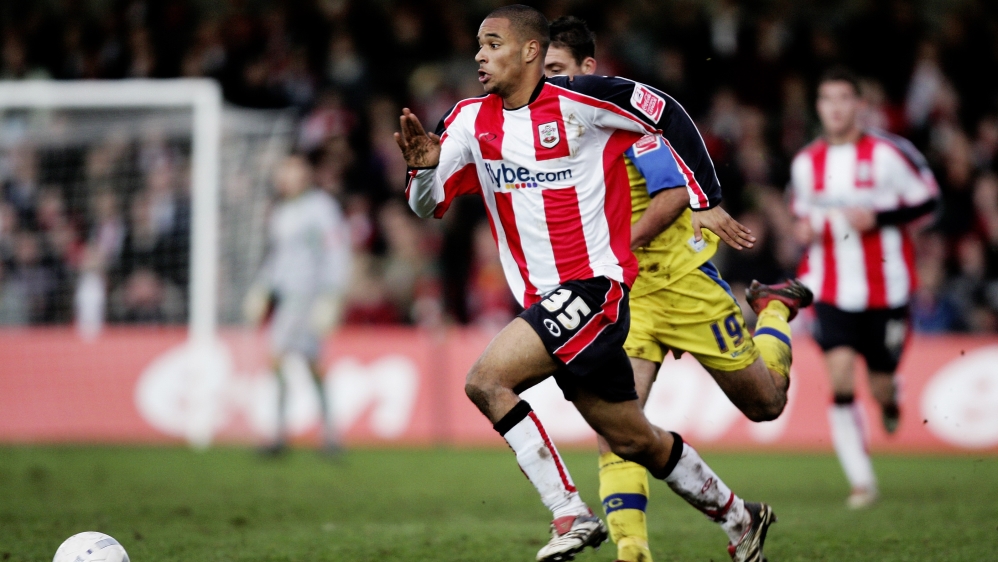
In July, a 12-year-old boy was arrested in relation to racist messages sent to Zaha and later released.
Zaha posted a message on Instagram immediately after the incident: "People need to understand whatever your age, your behaviour and your words come with consequences and you cannot hide behind social media.
"It's not enough to be disgusted by these messages I received and move on. It isn't enough to just say #notoracism. We need action, we need education, things need to change."
Rising awareness
Retired British sprinter Derek Redmond does not believe racism has got worse - just that there is greater awareness of it now.
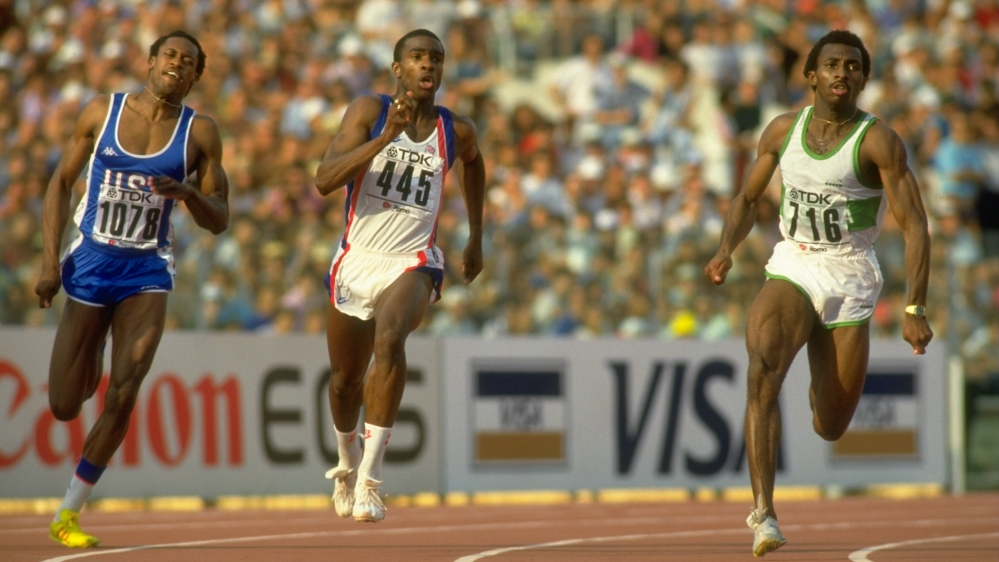
Speaking from his family home, the 1991 4x400m relay World Champion said: "Will Smith put it in a very good way when he said 'Racism is not getting worse, it is just getting filmed more.' It's just the modern way of racism. Bullying used to be on a one to one basis, now it's all over the internet."
Although Redmond says he never faced racism while competing, the profile sport gave him led to him being targeted. In 1997, three Danish neo-Nazis were jailed for attempting to send letter bombs to British targets.
Redmond and his wife at the time, former Olympic swimmer and television presenter Sharron Davies, were told by British police they had been targeted.
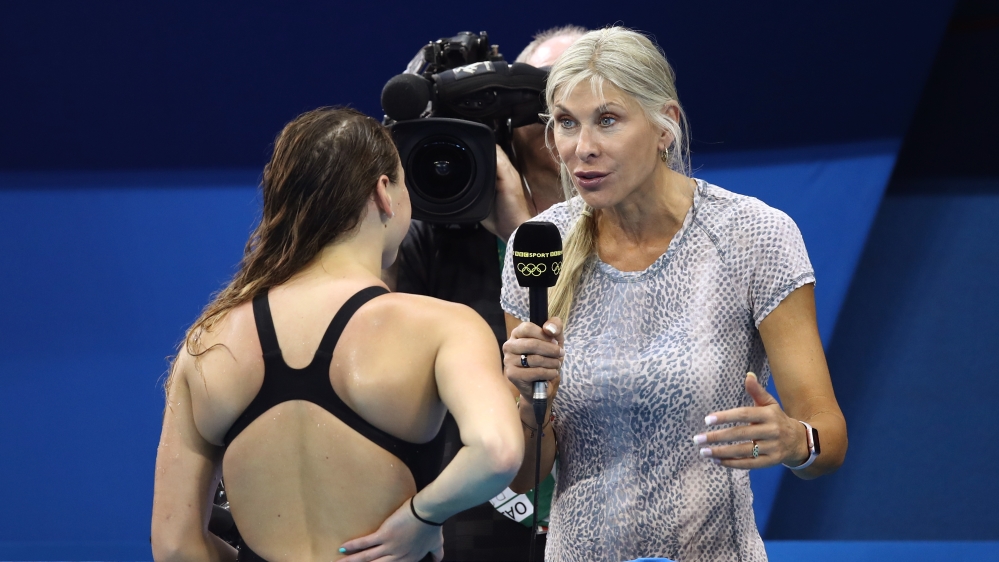
The 55-year-old explained: "A police force in London contacted us and said they managed to intercept a bomb that was targeted for me.
When asked what type of device it was we were told it could have blown a limb off, which was scary enough, but what made it worse was at the time our son was two to three years of age and opening parcels in the post was exciting. If he'd opened it, it could have killed him."
Racism on the field
Fast forward to the present day and extreme measures are still being taken to intimidate Black people in the UK.
A "White Lives Matter Burnley" banner was flown over the Etihad Football Stadium as Manchester City's home game against Burnley began in June, just minutes after players from both teams had taken the knee in support of Black Lives Matter.
But racism is not only an issue in top tier English football. Last October, an FA Cup qualifier between Haringey Borough, which plays in the Isthmian League Premier Division, and Yeovil Town, which plays in the National League, was abandoned after 64 minutes following racist abuse of a Haringey player.
On December 7, play was temporarily suspended in the Sky Bet League Two match between Forest Green Rovers and Scunthorpe United after a Rovers fan allegedly made racist comments towards visiting defender Jordan Clarke.
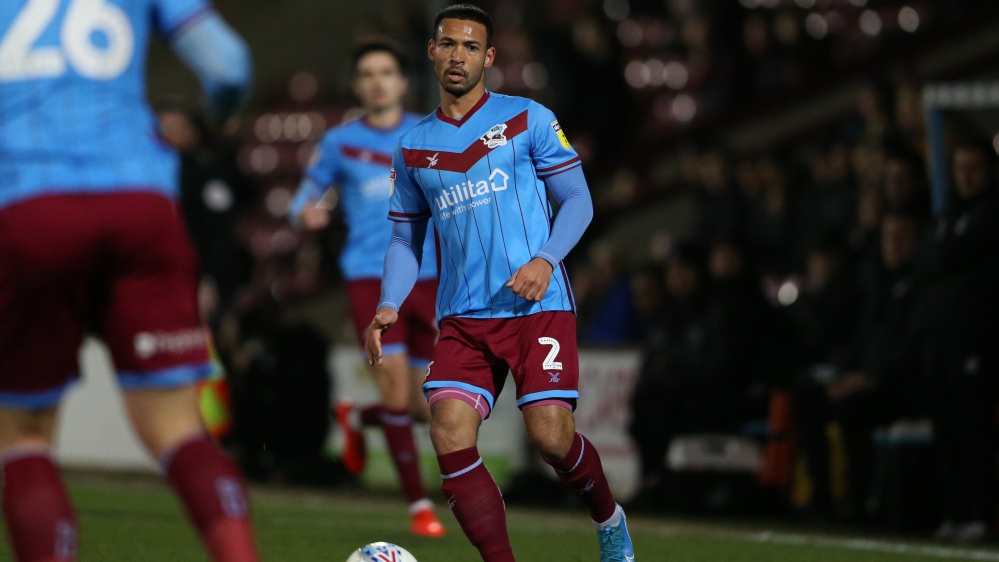
While most abuse in football comes from the fans, there have also been incidents of racism by players.
Renee Hector suffered the first recorded case of racism in women's professional football. The then-Tottenham Hotspur centre back was playing against Sheffield United on June 1, 2019 in the FA Women's Championship.

She explained what happened in a recent BBC documentary on racism: "We had a corner and as I jumped up I heard 'ooh ooh ooh' in my ear and I couldn't believe it because we've never heard of an incident like that on the pitch in women's football.
"I think the moment where it really sank in was when I went into the changing room and I was telling my teammates 'I can't believe what's just happened; the number 8 just made monkey noises in my ear as I went to head the ball'.
"At that point, that's when I started to feel anger and frustration."
Sophie Jones denied making the monkey noises but was found guilty by the FA. She was given a five-match ban and fined 200 pounds (approximately $258), after which her contract with Sheffield United was terminated by "mutual agreement".
But for Hector, who now plays for Watford, the racism she received did not end that day on the pitch. After tweeting about the incident, the responses she received included racist comments and photos of monkeys.
![Renee Hector of Tottenham Hotspur Ladies and Karen Carney of Chelsea Women in action on December 12, 2018 in Cheshunt, England [Paul Harding/Getty Images] British athletes on racism/Jacob Phillips](https://www.aljazeera.com/mritems/Images/2020/9/16/2e75e62ce1804f9caa477643432ae0e8_18.jpg)
Racism online
The access to athletes offered by social media has led to a huge spike in the amount of abuse they receive.
A YouGov poll of 1,000 football fans revealed that 71 percent had seen footballers targeted by racism on social media.
Kick It Out chair Sanjay Bhandari said: "Social media can be a battleground of hate. We need to work together across society to win this battle.
"We need better regulation and enforcement and we need social media companies to be part of the solution. We need clubs and governing bodies to continue to lobby for change, sanction offending supporters and support law enforcement processes with the provision of evidence."
And it is not just football.
British tennis star Jay Clarke took to Twitter in December 2019 to reveal he receives racist abuse "nine days out of 10".
![Jay Clarke of Great Britain during his Men's Singles first round match against Ernests Gulbis of Latvia on day two of the Wimbledon Lawn Tennis Championships at All England Lawn Tennis and Croquet Club on July 3, 2018 in London, England [Matthew Lewis/Getty Images] British athletes on racism/Jacob Phillips](https://www.aljazeera.com/mritems/Images/2020/9/16/4cfea71dd4e6452e8dc62b8bc60bdc2a_18.jpg)
Racism in the arena
Redmond believes a lot of racism comes from a place of ignorance. The retired sprinter set up the #IsthisYou? campaign to raise awareness of underlying racism.
"I was at an event at a private school where I'd given a talk," he explained. "This guy came up to me and said 'my granddaughter is pretty good at running; she finished fourth in a really big race. She'd really done well but only finished fourth because your lot are way quicker than her.' That is the kind of thing we need to eradicate.
"It's all about educating people and getting them to understand. Racism isn't just being part of the Klu Klux Klan or National Front.
"Roger Black was a white 400m runner and the number of people who used to say 'it's a white man in a Black man's event'. That's also racist."
Team GB swimmer Alice Dearing says she faced racist abuse as she rose through the ranks. The 23-year-old recounted a particular incident in the arena when she was 17.
![Alice Dearing [Photo courtesy of Alice Dearing] British athletes on racism/Jacob Phillips](https://www.aljazeera.com/mritems/Images/2020/9/15/75b3ef4290d048e8a122dc23e9e76a92_18.jpg)
"Another swimmer told me their coach called me a skinny n-word. I didn't know how to process it. I did cry about it. I was very upset," Dearing explained over the phone. "I went and told my coach as soon as I found out and he told me that's not okay. I just thought there wouldn't be anything we could do about it."
Dearing continued: "I had the choice to go to the police but I couldn't be bothered to drag the swimmer who told me through making a statement. There was no point dragging it out. We pretended it didn't happen because I didn't want it to affect my swimming in any way.
"I couldn't afford to let myself be a victim. It might be hard enough being a minority but the moment I start to think 'I'm a minority and people see me as a minority who they can talk down to' I lose."
Dearing, too, believes abuse comes from a place of ignorance: "Very often, it was children who say things and they are just not aware of the other issues people face when getting in the water because it is not made common knowledge.
"It's about educating people. It's about making people aware swimming caps are not one size fits all. We shouldn't all be forced to wear the same sized swimming cap.
![Alice Dearing [Photo courtesy of Alice Dearing] British athletes on racism/Jacob Phillips](https://www.aljazeera.com/mritems/Images/2020/9/15/e13b7d74f0b644d1a625c53732e770f2_18.jpg)
"I don't think there is anything wrong with ignorance as long as people learn about it so those mistakes are not made again. It is about making people aware of the diversity the sport requires."
Dearing believes for real change to happen, unnecessary boundaries must be removed. In swimming, these include ensuring swimming caps are adapted for Black hair.
"While the chlorine damages and dries out everyone's hair, arguably it is harder for Black women - hair can be so intertwined with our identity and the water completely changes the quality of it," she explained. "It is difficult. It's so time consuming and can really affect your image and how you feel about yourself."
Dearing has partnered with swimming cap company Soul Cap, which creates larger caps that protect Afro Caribbean hair, in order to help diversify one of Britain's least diverse sports. She is also a founding member of the Black Swimming Association, a charity that aims to encourage Black people to swim.
![Alice Dearing [Photo courtesy of Alice Dearing] British athletes on racism/Jacob Phillips](https://www.aljazeera.com/mritems/Images/2020/9/15/949a23a6004d4b8db4df5c06c1b846cf_18.jpg)
"We are finding ways to get people into the water. A swimming cap seems so simple but it's helped so many people already," she said. "Just having the option of giving somebody a larger cap with a logo on it [makes it] so much easier for people to fit in."
According to swimming's governing body Swim England, 95 percent of Black adults and 80 percent of Black children in England do not swim. The last recorded data from 2018 shows that less than 1 percent of registered competitive swimmers with Swim England identify as Black or mixed race.
Redmond relates to the issues Black people face when swimming.
"I can swim relatively well and people say 'you swim well for a Black guy. Your bones are too dense, you should sink' and you just think 'wow, where has that come from?'," he said.
![1988: Derek Redmond of Great Britain in action during the 400 metres event at the UK Olympic Trials in Birmingham, England [Bob Martin/Allsport courtesy of Getty Images] British athletes on racism/Jacob Phillips](https://www.aljazeera.com/mritems/Images/2020/9/15/4ac0dd6b8579499e8dfa4a8ef5033451_18.jpg)
"My daughter tells me about how people say 'oh, let me feel your hair, it's so smooth' and it's not meant as a racist slur or comment, but it is racist in the way that it is not something you do."
Dearing says she is fed up with hearing about the issues Black people face when getting in the water. "We want to be that bridge to get people in the water and get people swimming; to break down those barriers."
If Dearing qualifies for the 2021 Tokyo Olympic Games she will be the first Black woman to represent Great Britain in swimming at the Olympics. In doing so she hopes to inspire young Black athletes to turn to swimming as a sport.
"Representation really matters. People will look at an Olympic final and see no people of colour and think 'that's not a sport for me'. They will look at other sports like athletics and see a much more diverse field and probably gravitate towards that," she said.
"It is a chance to help make history and represent and help show young Black boys and girls that it is a sport for them and it is well within their reach. It's something much bigger than myself and my career. It transcends my lifetime, and that excites me."
Black role models
While Dearing has had Black swimming role models such as Simone Manuel, who at the Rio Olympic Games in 2016 became the first African American woman to win an individual Olympic gold in the pool, other Black sportspeople have had to look to sports outside their own to see athletes who look like them.
![Gold medalist Simone Manuel of the United States celebrates during the medal ceremony for the Women's 100m Freestyle Final on Day 6 of the Rio 2016 Olympic Games at the Olympic Aquatics Stadium on August 11, 2016 in Rio de Janeiro, Brazil [Clive Rose/Getty Images] British athletes on racism/Jacob Phillips](https://www.aljazeera.com/mritems/Images/2020/9/15/6875a7aca15a4c3e8666e99c8bc9a7f9_18.jpg)
England Under-21 hockey player Darcy Bourne says she has not had any Black role models to look up to in her sport. Like Dearing, Bourne is now hoping to become a role model for others.
In August, nine clubs sent a letter to hockey's governing body, outlining how English hockey - from the national team to the club game and junior levels - has an "endemic race issue".
"In tennis and athletics there are more ethnically diverse role models out there," said 18-year-old Bourne. "I looked up to the Williams Sisters and [Dina] Asher-Smith in athletics. There aren't any female role models who are Black [in hockey].
![Serena Williams poses with the Daphne Akhurst Trophy after winning the Women's Singles Final against Venus Williams of the United States, posing with the runners up trophy on day 13 of the 2017 Australian Open at Melbourne Park on January 28, 2017 in Melbourne, Australia [Scott Barbour/Getty Images] British athletes on racism/Jacob Phillips](https://www.aljazeera.com/mritems/Images/2020/9/15/4a9743c315c04048a82850e882b84dfb_18.jpg)
"As a young person you do look up to people who look similar to you. It didn't discourage me from wanting to play hockey. I was always accepted and never had any discrimination or had any racist acts against me in the hockey community.
"If anything, having a lack of Black role models has inspired me to go further," she added.
![Ashleigh Nelson and Dina Asher-Smith of Great Britain after winning silver in the Women's 4x100m final during day nine of 17th IAAF World Athletics Championships Doha 2019 at Khalifa International Stadium on October 05, 2019 in Doha, Qatar [Richard Heathcote/Getty Images] British athletes on racism/Jacob Phillips](https://www.aljazeera.com/mritems/Images/2020/9/15/5b3f5148f20541429630ff3fa53b39d0_18.jpg)
Overall Redmond believes the refuge sport provided for him when he was young helped him overcome abuse.
"One of the things sport did for me was it was my safe place," he explained. "It was the one place where I could excel and be me and do my best. It was the one area where I knew I could get accepted.
"It was a place where I could be and not get all the hassle and abuse. I could get my own back on [bullies] and make them look stupid by running quicker than them. It actually helped me deal with it all and I felt more at home when I was training and practising than I did at any other point in my school career."
Latest Stories
-
Stampede in southwestern Nigerian city causes multiple deaths
17 minutes -
Tens of thousands without water in Mayotte as curfew brought in
30 minutes -
ORAL: We won’t witch-hunt, we’ll focus on transparency, not revenge – Ablakwa
53 minutes -
Attempted robbery: Accused claims he carried cutlass for protection
1 hour -
Excavator operator jailed for stealing
1 hour -
African fans age-shame me for putting on some outfits – Tiwa Savage
2 hours -
Tiwa Savage criticised by female fans for stance on cheating in relationships
2 hours -
Bank of England expected to hold interest rates
2 hours -
Congo river boat sinks killing at least 22
2 hours -
Embattled Liberian speaker questioned by police over parliament fire
3 hours -
‘I won’t be a judge in my own court; ORAL is about protecting public purse’ – Ablakwa
4 hours -
Bawumia joins thousands in Kumasi for burial prayers for Ashanti Regional Imam
4 hours -
Blue Gold Bogoso Prestea Limited challenges government actions in court
4 hours -
Verdicts due for 51 men in Pelicot mass rape trial that shook France
4 hours -
Syria not a threat to world, rebel leader Ahmed al-Sharaa tells BBC
4 hours

